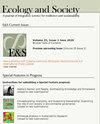Culture and parks: incorporating cultural ecosystem services into conservation in the Tibetan region of Southwest China
IF 3.2
2区 社会学
Q1 ECOLOGY
引用次数: 4
文化与公园:将文化生态系统服务纳入中国西南藏区的保护
本文章由计算机程序翻译,如有差异,请以英文原文为准。
求助全文
约1分钟内获得全文
求助全文
来源期刊

Ecology and Society
环境科学-生态学
CiteScore
6.20
自引率
4.90%
发文量
109
审稿时长
3 months
期刊介绍:
Ecology and Society is an electronic, peer-reviewed, multi-disciplinary journal devoted to the rapid dissemination of current research. Manuscript submission, peer review, and publication are all handled on the Internet. Software developed for the journal automates all clerical steps during peer review, facilitates a double-blind peer review process, and allows authors and editors to follow the progress of peer review on the Internet. As articles are accepted, they are published in an "Issue in Progress." At four month intervals the Issue-in-Progress is declared a New Issue, and subscribers receive the Table of Contents of the issue via email. Our turn-around time (submission to publication) averages around 350 days.
We encourage publication of special features. Special features are comprised of a set of manuscripts that address a single theme, and include an introductory and summary manuscript. The individual contributions are published in regular issues, and the special feature manuscripts are linked through a table of contents and announced on the journal''s main page.
The journal seeks papers that are novel, integrative and written in a way that is accessible to a wide audience that includes an array of disciplines from the natural sciences, social sciences, and the humanities concerned with the relationship between society and the life-supporting ecosystems on which human wellbeing ultimately depends.
 求助内容:
求助内容: 应助结果提醒方式:
应助结果提醒方式:


